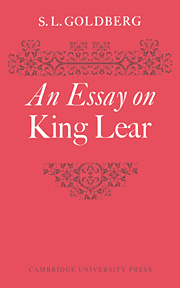3 - The minor characters
Published online by Cambridge University Press: 22 August 2009
Summary
If the action of King Lear does not essentially consist in Lear's story that does not mean he is any the less the hero. It only means that, although he is at the centre of the play, neither his consciousness nor his experience comprehends all of its meaning; and further, that we cannot identify with him, or see him in a special, privileged way, or respond to him or his speeches with a different kind of sympathetic understanding and critical detachment from that with which we respond to anyone else. In fact, he is the hero for the same reasons as require us to acknowledge the reality, force, and limitations of the other characters in so far as they exist for us (in their varying degrees of density) as characters at all. His ‘heroism’ requires their specific selves as its very condition. The terms on which they enter into the action as characters are those examined most profoundly and thoroughly in Lear – in what is at issue in his self and his experience, in his particular ‘address’ or ‘stance’ towards his world, and what his transactions with it reveal about the world that he, and his world, and the other characters' transactions, constitute for us. Each of the other characters, being composed by the same creative activity out of the same material as he, though in a way that testifies to his larger stature and vitality, unfolds a kind of commentary on him – as he on them.
- Type
- Chapter
- Information
- An Essay on King Lear , pp. 68 - 102Publisher: Cambridge University PressPrint publication year: 1974



